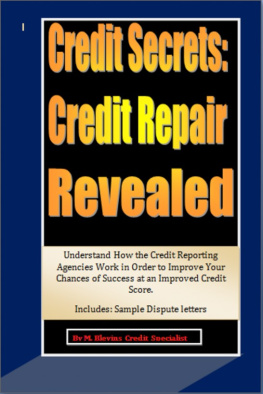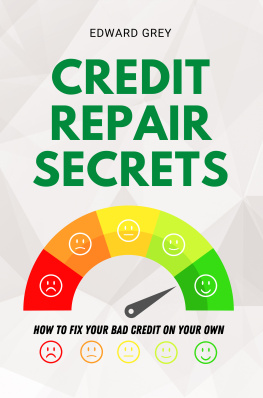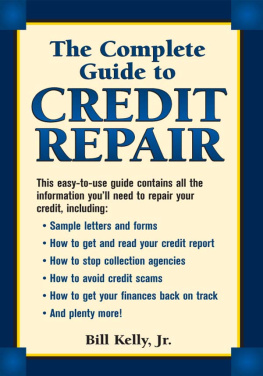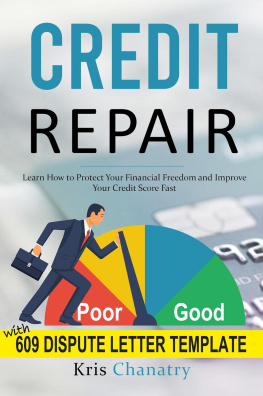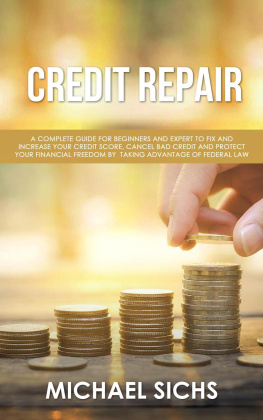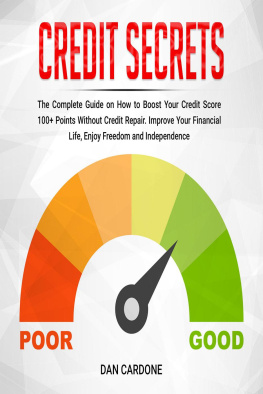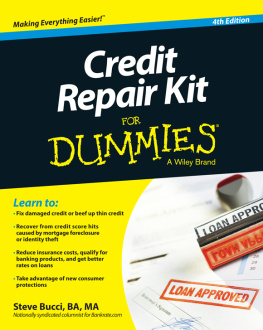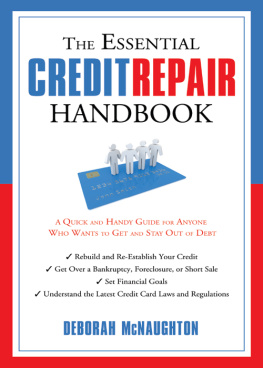CREDIT SECRETS:
CREDIT REPAIR REVELED
M. BLEVINS
Copyright 2014 by M. BLEVINS
Smashwords Edition
Congratulations!
You have decided to take a step towardrepairing your credit. For whatever the reason you have decided todo this, you need to pat yourself on the back. You have learnedthat your credit is an important extension of yourself. Yourcredit, in this day and age, is your identity when it comes tobanking and loan institutions. Seldom will you find, anymore, thebank that will provide you credit based on your relationship withthem and reputation.
There is nothing more frustrating thanneeding a new car and unable to buy one without good credit unlessyou have enough money to buy credit. This is why Buy Here PayHere car lots are as abundant, as these businesses are aware thataround 70% of Americans have damaged credit. With the recent yearsof recession the average credit score among Americans have dropped.These businesses are laughing all the way to the bank with theirhigh interest rates, high car prices and large down paymentsrequirements. Many of these companies are pushing the Federal UsuryLaws if not outright violating them. With a poor credit score yournegotiating powers with these companies is all but gone and you canget stuck with a subpar car that they are willing to repossess atthe slightest hint of financial trouble. As unethical as thispractice is, it is legal.
In taking the initiative in controllingyour credit, you are empowering yourself to save money, and a lotof it, over the next few years and potentially a lifetime. Thisprocess is not an overnight process, however, is just a few shorthours you can learn what you need to better protect yourself fromdeceptive collection practices and in no time. Usually inaround 6-9 months you can have a credit score worthy of ahome loan (Fico score of 640+)
Why is it important to know my rightsregarding credit collections?
Here is a money saving tip that youwill want to practice from here on out. Collection companiesviolate Fair Credit Reporting Act, Fair Debt Collection Act andUsury Laws with their practices. Debt collectors buys bulk accountsfor pennies on the dollar and any money they obtain from theircollection practices is mainly profit. These are known as zombiedebts, because the debt has been unable to be paid back by theconsumer, and many are past statute of limitation on collecting(this will be discussed later). They have been known to curse,threaten, lie, and harass consumers. They will tell you the onlyway to get items off your credit are to pay them, which is untrue.Negative credit accounts with the exceptions of Judgments, Liens,Bankruptcy and Student Loans, will be removed seven (7) years fromthe last PAYMENT date. In order to protect their investment,creditors will not disclose this information and will blatantly lieif asked the ways accounts can be removed. Lets give an examplehere.
If you owe Bank A $2500 from a creditcard that you were unable to pay. Your last payment of $25 was madein October 2010. With the seven year law, this account would bescheduled to drop off your credit in October of 2017. They havedecided they cannot collect and sale the account to a debtcollector.
So, Bank A sells the zombie debt toCollector B. Collector B changes the account number of the account,the date of last activity (in this case October 2010) to the datethey acquired the debt, say January of 2014, and then theyunilaterally decide that your $2500 debt to Bank A is now worth$7000 (this is a real scenario I have seen). You see this accounton your credit and are not sure what this is, so you call the debtcollector. By this time, they have already sent you notices of thisdebt by mail and have probably gave you 30 days to dispute theitem, otherwise you agree to the debt by admission by silence.Basically, they are saying that since
you didnt dispute this, you agree thatthis item is your debt and therefore, yourresponsibility.
You probably threw the notice out asmany people do with mail they dont know or if they are aware itsan old debt that they cant pay. They may even begin calling youseveral times a day until you pick up the phone. Technicallyspeaking, the laws that are designed to protect the consumer arebeing violated in every aspect of this scenario.
When you speak to a representative fromthe company they are generally very forceful in their language.They will first ask you to verify your personal information. Theydo this for a few different reasons. If you verify yourinformation, they have an affirmative defense that the account isyours. Also, if they cannot verify your personal information, thenthey are violating another law that protects your privacy if theycontinue the conversation. They also have to identify that they area debt collector attempting to collect a debt and all informationcollected is in an effort to collect the debt. If they do notinform you of this, its another violation of the law. So, alreadyin this scenario several violations could have beenmade.
After the preliminaryintroduction, you finally get down to business. The collector isgoing to connive, convince, and potentially coerce you to make apayment on your account. They attack your character for not payingthe account if you give resistance and may violate the laws withthreats of jail time or taking personal property. If you pay anymoney be it, $1 or $1000, you have just re-aged youraccount. Instead of the account falling off in October of 2017, youhave re-aged the account to seven (7) years from the dateof the payment, say February 2014. So now your drop off date isFebruary 2021. This also re-ages this account on yourcredit which instead shows that instead of four years ago, only 4months ago you were delinquent on your account, therefore, droppingyour credit score. So why would a person do this to themselves? Thesimple answer is that people dont understand the system. This iswhy utilizing credit repair is better off than paying thedebt.
When you are dealing with statute oflimitations, there are a few dates to consider. The first is thedate the original item is due to drop off your credit. We havealready discussed the seven (7) year rule. The next date is thestatue of limitations on filing a judgment in the court. In thestate of Texas, the statute of limitation on suing for a debt isfour (4) years from the date of the original delinquency. Thismeans, that in our scenario that after October of 2014 if you livein Texas, you cannot be sued for this particular debt. Now, if thecreditor re-ages the debt legally or illegally, they cansue you in court and if you do not respond or challenge thedispute, then they obtain a default judgment and you are thenlegally liable for the debt. You can fight an illegally obtainedjudgment, but by this time, the cost may be more than the actualdebt. In many cases, if you dont own property such as a house,land, etc., many creditors wont bother with the cost of thejudgment because there is nothing to hold you to the debt. If youare a home or land owner, you will not be able to sale yourproperty until the debt is paid, out of closing cost or otherwise.Thats not to say that they wont file a judgment against you. Oncea judgment is filed, it may drop off your credit report but it willbe in court records and in some cases, indefinitely. Some statesallow wage garnishments, so if you have an judgment against you,they can file with the court to take up to a certain percentage ofyour disposal income. Disposable income is your income after theytake out taxes and insurance, so basically your net income. In somecases, it can be 25% or more until the debt is paid. You shouldcheck the statue of limitations of your state and whether or notthey allow wage garnishment. This should be taken intoconsideration when repairing your credit.
In many cases, once you start creditrepair, previously old debts that havent had any activity in a fewyears may, all of a sudden, become active by selling the debt to adebt collector. This is in response to a challenge to the debt.This happened to a client of mine with an old credit card. Onemonth after a dispute on her credit report, her account was nowwith a new collector and over $4000 was added to the account. Theaccount has only nine more months under the statute of limitationsfor dropping off but the collector attemptedto re-age the debt illegally. By law, all information ona credit report must be correct.
Next page
